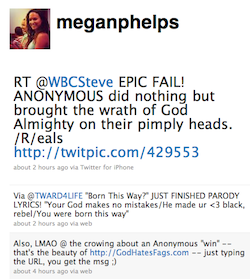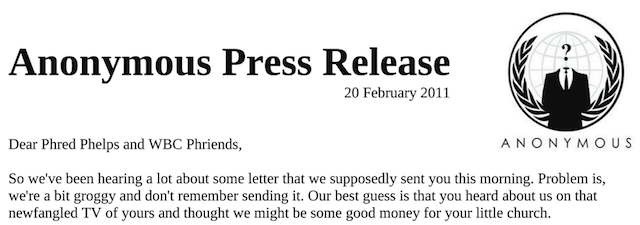On February 16, the freewheeling hacker collective decided to take on the Kansas-based Westboro Baptist Church, best known for its "God Hates Fags" protests. The Anonymous hivemind, the "Voice of Free Speech & the Advocate of the People," has had enough of this sort of free speech and has decided to fight the church's "assembly of graceless sociopaths and maniacal chauvinists & religious zealots" who issue "venomous statements of hatred."
The manifesto contains the trademark Anonymous prose style, one that might be summed up with the words "florid bombasticism." (Case in point: "Your demonstrations and your unrelenting cascade of disparaging slurs, unfounded judgments, and prejudicial innuendos, which apparently apply to every individual numbered amongst the race of Man ")
And it closes with the typical Anonymous threats, which drinks deep from the wells of prophetic denunciation literature—combined with a splash of The Matrix. "We will target your public Websites, and the propaganda & detestable doctrine that you promote will be eradicated; the damage incurred will be irreversible, and neither your institution nor your congregation will ever be able to fully recover. It is in your best interest to comply now, while the option to do so is still being offered, because we will not relent until you cease the conduction & promotion of all your bigoted operations & doctrines. The warning has been given. What happens from here shall be determined by you."
But did Anonymous really write this? An "organization" without traditional leaders or members faces a problem: knowing who speaks officially for the group. The message had been posted to AnonNews, a site with an "open posting concept" in which "no censorship takes place!"
Within days, other Anons were backing away from the idea of going after Westboro, even as the church tried to taunt them into action.
The art of trolling

On February 20, Westboro responded in an "Open Letter from Westboro Baptist Servants of God to Anonymous Coward Crybaby 'Hackers'." The letter is so over-the-top that it makes Anonymous pronouncements look like philosophical discourses by contrast.
Westboro asks Anonymous to "BRING IT!" and insists that "the only reason the Internet exists is for Westboro Baptist Church to tell this nation & this world that your destruction draws nigh." The letter blasts the "puddle of pimple-faced nerds organized under the cowardly banner of 'Anonymous'" calls the hackers "girls" (an apparent insult), and insists that "Anonymous is warring with God."
Megan Phelps-Roper, grandaughter of Westboro pastor and patriarch Fred Phelps, kept up the trolling on Twitter. "Oh, didn't you hear? Anon.'s gone back to their cowardly corners to lick their wounds. =)," went one message. In Westboro's book, publicity of any kind is a good thing, since it means "that more people will hear this msg: obey or perish! Awesome, right? #ThatsHowGodRolls."
God actually figures in many of Westboro's hash tags. The church's WBCpreacher account also took aim at Anonymous, saying, "Pretty sure at this point they couldn't collectively order a PB&J sandwich w/o an argument #GodSendsThemDelusion."
Clearly, someone at Westboro has taken introductory classes in Internet trolling, though it all seems a bit obvious; the secret gnosis of Advanced Internet Trolling has apparently eluded them.

Anonymous, no strangers to the art of the troll, largely ignored the bait. In a letter posted to AnonNews on the same day, 20 Anons took jabs at the media for writing up the story based on that initial Anonymous statement. "Just because it was posted on AnonNews doesn't mean every single Anon is in agreement, in fact in this case it doesn't even mean a single Anon is in agreement," they said.
As for Westboro, the letter calls the church's troll a "honeypot" designed to harvest the IP addresses of those tempted to attack the church's websites, presumably with the goal of then suing them in order to drum up even more publicity. The church should be ignored.
Still, Anonymous couldn't let the insults pass entirely without answer. "In closing, let us assure you: We are not BAWWWING sissies, nor are we afraid of your false god; we're just really busy. Stay tuned, and we'll come back to play another day."
But when no one's in control, such pronouncements only matter insofar as they convince others in the group. Indeed, on February 20, some Anon posted the names, phone numbers, and addresses of the entire Phelps clan under the title "West Derpish Derp Church." People were asked to "stop wasting time DDoSing these faggots. They're trolling us, so troll them back."
Productive chaos?
The whole event has caused some soul-searching among Anonymous members, who have taken to posting messages about the group's purpose and methods. Some believed that Westboro deserved the attention of Anonymous—so long as that attention took the proper form.
"It's time to dig up the darkest secrets of the Westboro Baptist Church and its members," wrote one Anon. "It's time for the fight to go to the insane people who manage the church. Let's figure out what they're hiding and publicize the hell out of it. If we attack them because we hate their message, it will only publicize their radical views even more. Fred Phelps, be afraid. We are coming for you. We apologize that we jumped the gun earlier and without a proper motive. The next time we contact you, we will have something to talk about."

A common complaint was about being sidetracked. Another concluded, "Anonymous, you've decided to go f**k about with trolls rather than helping protestors gain their freedoms. Why, Anonymous?"
A Christian Anon begged his compatriots to ignore Westboro in favor of more important projects. A UK Anon suggested that the group was "being trolled into the sh*t by the religous right."
Other notes went even further, casting doubt on past operations like the recent hack into security firm HBGary. "We have invaded the privacy of corporations, and no matter what other Anons say, the standard behind Anonymous did not agree with the HBGary hit," said one document. "In fact, many of us are waiting for those who were involved in that Operation to be taken in by the law and will not associate with that sort of outlet. Those who are happy with that Operation are nothing more than trolls and we apologize for this as well."
Reading the blizzard of Anonymous notes on the topic of Westboro, one can see the hivemind in action. It's chaotic, often at odds with itself, and open to simple infiltration (several pieces suggested that Westboro may have written the initial "Anonymous" press release just to ignite a war). Leadership is exerted through numbers more than through hierarchy.
Clear downsides exist for this model. Hotheads will always go off and troll people for "the lulz," even as those more concerned with freedom of speech, WikiLeaks, and African protest movements cringe in horror at the damage such attacks can do to the Anonymous reputation. But the great strength of this wildly distributed approach is the way it allows new ideas to bubble up, find like-minded supporters, and express themselves in action. That gives the movement vitality, adaptability, and the occasional black eye. But it's the way Anonymous wants to operate, and by doing so the group has managed to capture the world's attention.
How long such a chaotic organization can last in its current form is anyone's guess, but the chaos means that Anonymous always has internal resources for renewing itself. For instance, some in the group use a tagline:
We are Anonymous. We are legion. We do not forgive. We do not forget. Expect us.
But should the day come when that message seems too vindictive, other members of Anonymous have already created a softer alternative:
We may be Anonymous, but we are still human. We may never forgive, but we are still capable of compassion. We may never forget, but we are still a bad memory for some. Expect us. Just not all of us.
reader comments
137